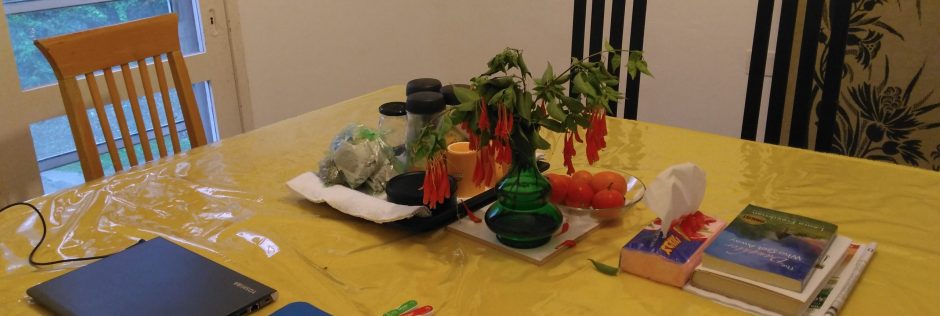
Morris had a large, leather-covered box which was a Graflex camera. When he touched a bump in the textured leather exterior, the viewfinder popped up, revealing a dark, velvet-lined tunnel. To take a picture, he rested his forehead against the velvet opening while mysterious things happened with lenses and mirrors inside the box. When Morris pushed another bump in the leather, hidden doors opened into velvet-lined compartments. Morris’ son Evan loved the Graflex and would hide his toy animals behind the secret doors. Evan had a collection of glass and china dogs, cats, rabbits, and horses. The animals took turns living inside the camera and sometimes took long trips in a velvet compartment until Morris opened the door, looking for an extra roll of film, and found a little rabbit or dog inside.
Evan wanted to use that camera from the time he was small. But his father wouldn’t let him. “When will you let me use your camera?” Evan asked. His father replied, “When I die, you’ll inherit it, and then you can use it.” “When will you die?” Evan asked with great interest. His father gave him a different camera and taught him how to use it.
Morris was a successful dentist and could buy many cameras and lenses, but he also added to his collection by accepting cameras traded for dental work. He had a lot of Leicas because the Leica Company helped Jews to escape Germany by giving them cameras, enabling them to pose as Leica salespeople. Evan was supposed to become a dentist. His father had struggled through dental school, built a large practice, and wanted Evan to go into partnership with him. When Evan began molding his own dogs, rabbits, and horses-with-riders out of clay, all the adults praised his skill with his hands and said he’d make a wonderful dentist. When they said this, he would offer to make them a horse with a rider.
Evan did not like chemistry class, or biology, or calculus. What he liked best was taking pictures and developing them in the darkroom Morris set up in the bathroom. Eventually Evan dropped out of pre-med school and went to work in the Slide-o-Chrome professional photographic lab of New York. He got his first job by pretending to get it. The lab had brought in a number of applicants and asked them to mix, heat, and chill chemicals. They said they’d call the people chosen for the job. Evan didn’t get a call, but he showed up for work on Monday morning and they let him continue.
He was assigned to the Dip-‘n-Dunk, and he learned to make hundreds of prints of people’s baby pictures, advertising shots, and magazine illustrations. The chemicals were heated in fifty-gallon tanks inside a water bath. If the temperature got too high, Evan went down to the street and bought a chunk of ice from the ice-man to cool down the chemicals’ bath. Evan learned to live in darkness as if it were light. He found his way around the lab in total darkness, clipping pieces of exposed film to the processing frames, which were placed in a metal basket and lowered by pulley into a succession of chemical tanks. Evan pushed the basket through to a holding tank and shut a door; people who worked in light opened a door on the other side. Once each day at lunchtime, Evan emerged from the darkroom and went to the same Hispanic deli to buy a spicy egg sandwich. When the owner saw Evan coming, he started chopping vegetables for his sandwich.
Morris was not happy about this career choice, but when Evan rose to become a Master Printer Morris made his peace with it and even became somewhat proud of Evan’s accomplishments. When Morris died, Evan’s brothers insisted that he inherit the best of their father’s cameras and lenses. Evan kept them in their velvet-lined cases and did not allow the children to play with them. Even when new, digital cameras became available, he continued to take pictures with the cameras he inherited from Morris.
Copyright © Leora Freedman 2015
***If you have something to say, or a story to share, our comments page is the place to leave it!
 Copyright secured by Digiprove © 2015 Leora Freedman
Copyright secured by Digiprove © 2015 Leora Freedman 
 Bert Moore-Owen was a Unitarian minister in downtown Manhattan. One spring, he preached a sermon that touched on Passover, but he admitted he’d never seen a seder. Afterwards, a congregant approached him and said, “If you’re interested in attending a seder, I know a family who’ll invite you.” So Bert and his wife Bea, also a Unitarian minister, came to seder at the home of Flora and Morris Feuerstein. The two families became lifelong friends. Flora’s sons called the ministers Aunt Bea and Uncle Bert, as if they were relatives.
Bert Moore-Owen was a Unitarian minister in downtown Manhattan. One spring, he preached a sermon that touched on Passover, but he admitted he’d never seen a seder. Afterwards, a congregant approached him and said, “If you’re interested in attending a seder, I know a family who’ll invite you.” So Bert and his wife Bea, also a Unitarian minister, came to seder at the home of Flora and Morris Feuerstein. The two families became lifelong friends. Flora’s sons called the ministers Aunt Bea and Uncle Bert, as if they were relatives. Morris emigrated from Russia as a boy around 1910. After a few years in America, he began reading all the books in the children’s library. One day, he went to the librarian, anxious that a book was missing from the shelf. “How can I go on reading?” he asked. Like many children’s librarians, she was the salt of the earth, so she asked him to show her what he meant. Looking at the empty space between two books on the shelf, she realized that he thought a child had to read each book owned by the library, in order from A to Z. In his mind, each book was an obligation, and the pleasure of reading entailed responsibilities.
Morris emigrated from Russia as a boy around 1910. After a few years in America, he began reading all the books in the children’s library. One day, he went to the librarian, anxious that a book was missing from the shelf. “How can I go on reading?” he asked. Like many children’s librarians, she was the salt of the earth, so she asked him to show her what he meant. Looking at the empty space between two books on the shelf, she realized that he thought a child had to read each book owned by the library, in order from A to Z. In his mind, each book was an obligation, and the pleasure of reading entailed responsibilities.




 There was a tradition of being committed to something important outside the family. For example, Joseph was president of HIAS between the two world wars and was always out at meetings trying to save Europe’s Jews. He even traveled to Washington to tell the US government it had nothing to fear from Jewish refugees, though he did not gain Washington’s mercy. Joseph’s children, Flora and Edwin, lived safely in Brooklyn and wanted a dog. Joseph said no, as he disliked and even feared dogs. The children pleaded but he would not relent. “It’s either me or the dog,” he told them. They thought it over and came back to him with their decision. “We’ll take the dog,” they said, “since you’re never at home. The dog will always be at home.”
There was a tradition of being committed to something important outside the family. For example, Joseph was president of HIAS between the two world wars and was always out at meetings trying to save Europe’s Jews. He even traveled to Washington to tell the US government it had nothing to fear from Jewish refugees, though he did not gain Washington’s mercy. Joseph’s children, Flora and Edwin, lived safely in Brooklyn and wanted a dog. Joseph said no, as he disliked and even feared dogs. The children pleaded but he would not relent. “It’s either me or the dog,” he told them. They thought it over and came back to him with their decision. “We’ll take the dog,” they said, “since you’re never at home. The dog will always be at home.” The Dive was an apartment Flora and her friends rented in a Greenwich Village brownstone in 1928. They were all from nice Jewish families and would not have been allowed to live there, but they used it as a student hangout during the day. The apartment was small: You could take a bath and cook a meal at the same time because the toilet and bathtub were in the kitchen. Flora was the only inhabitant of the Dive whose parents knew of its existence.
The Dive was an apartment Flora and her friends rented in a Greenwich Village brownstone in 1928. They were all from nice Jewish families and would not have been allowed to live there, but they used it as a student hangout during the day. The apartment was small: You could take a bath and cook a meal at the same time because the toilet and bathtub were in the kitchen. Flora was the only inhabitant of the Dive whose parents knew of its existence.